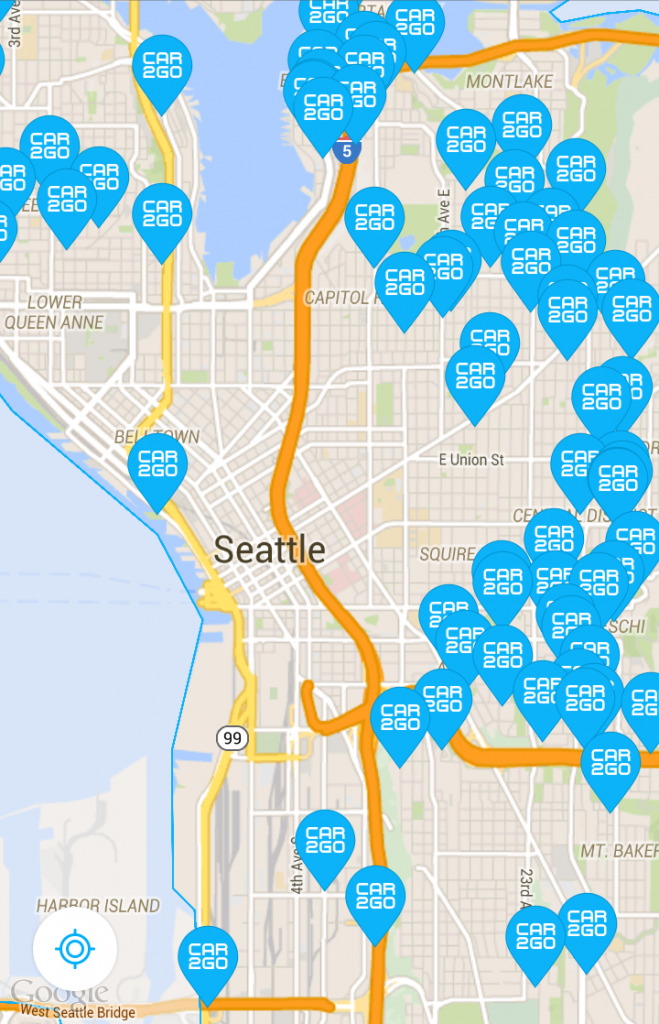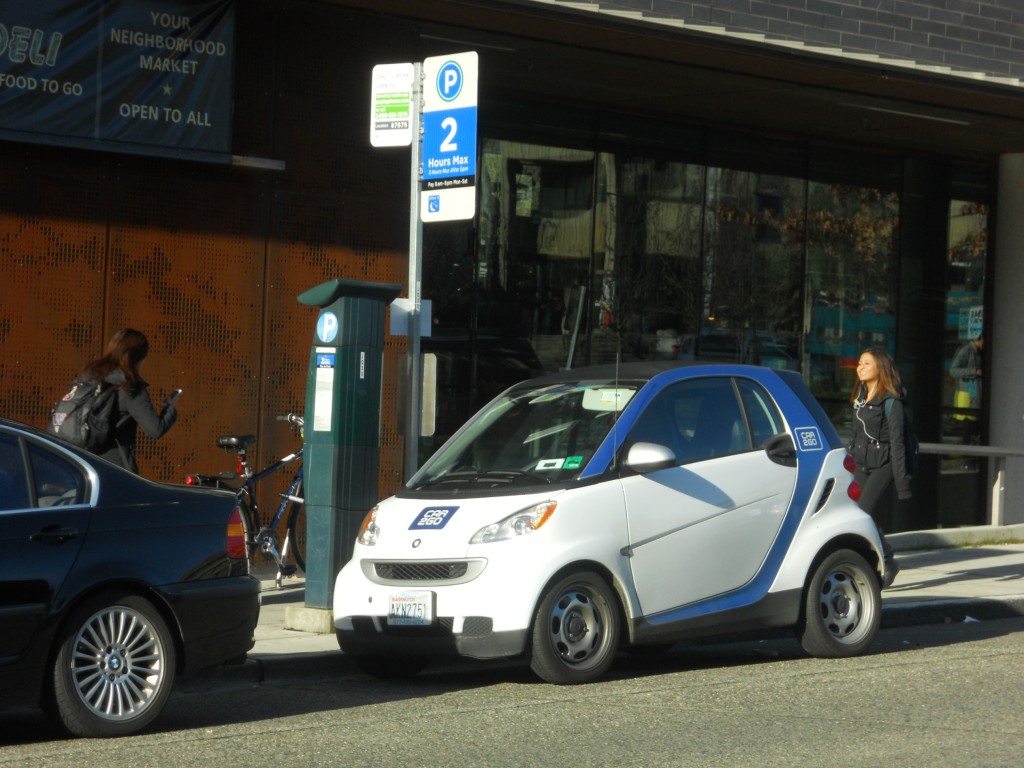On Tuesday, the Seattle City Council transportation committee voted to approve an increase in the number of free-floating carshare permits and operators. This would primarily benefit car2go, the German company whose blue-and-white mini cars are rented on a per minute basis. Up from 350 vehicles beginning in 2012, the company has reached the 500 vehicle cap under a pilot program monitored by the Seattle Department of Transportation (SDOT). The service has proved immensely popular, and reportedly has 59,000 members in Seattle–the largest of car2go’s 30 home cities–representing nearly one-tenth of the city’s population. The company has requested authority to expand. The proposed legislation (PDF) will increase the permit cap six-fold and allow up to four carshare operators in the city.
In the car2go model, drivers don’t need to return the vehicle to a dedicated parking space, hence the term “free floating”. This enhances the public transportation network by enabling trips that may be inconvenient to reach by other means. Members can reserve vehicles up to 30 minutes in advance online or walk up to a vehicle on the street and go. Drivers can park on most streets, with exceptions on some business and arterial streets. According to a staff report (PDF), the vehicles currently occupy only 0.7% of the city’s paid parking space. On average, each vehicle is used six times per day and parked only 68 minutes between trips. Personal vehicles are unused 95 percent of the time.
Committee chair Tom Rasmussen noted that car2go estimates up to 4% (2,360) of Seattle members have ditched a personal vehicle since joining, which removes the option of driving everywhere for every activity and results in congestion reduction. Increasing membership of carshare services will only improve this outcome. SDOT Director Scott Kubly said car sharing is “…a key component to creating choices for people to get around the city, and allowing people to live a car-free or car-light lifestyle”.
 The pilot program’s limitations will be resolved by the proposed legislation. There will be a cap of four car share operators; only two others, Zipcar and BMW’s DriveNow, have expressed interest, but the additional competition will enable the market to set prices and create greater consumer choice. The pilot program’s service area will also expand to the entire city limits, up from about two-thirds of it now. And after two years of service, new operators will be required to serve the entire city in exchange for an increased cap of 750 vehicles per operator (car2go would fall under this now). Effectively, this translates to a maximum of 3,000 car share vehicles citywide. That’s in addition to the hundreds of spot-based Zipcars already in place. The legislation requires regular reports from SDOT, and starting next year the SDOT Director is authorized to adjust the caps as necessary.
The pilot program’s limitations will be resolved by the proposed legislation. There will be a cap of four car share operators; only two others, Zipcar and BMW’s DriveNow, have expressed interest, but the additional competition will enable the market to set prices and create greater consumer choice. The pilot program’s service area will also expand to the entire city limits, up from about two-thirds of it now. And after two years of service, new operators will be required to serve the entire city in exchange for an increased cap of 750 vehicles per operator (car2go would fall under this now). Effectively, this translates to a maximum of 3,000 car share vehicles citywide. That’s in addition to the hundreds of spot-based Zipcars already in place. The legislation requires regular reports from SDOT, and starting next year the SDOT Director is authorized to adjust the caps as necessary.
The permit cost for each vehicle will increase from $1,330 to $1,730. During the public hearing, car2go representative Walter Rosenkrantz said the company could not simply absorb that cost and may need to raise rental rates or reduce their sponsorship of community groups and events. SDOT’s reports are to include data on neighborhood parking rates and utilization so that fees can be adjusted as needed. Other considerations brought up were the desire for electric vehicles, though that would present logistical problems for charging, and the feasibility of integrating the ORCA card system with car2go. The legislation will next go to the full City Council.
Things are looking up for transportation in Seattle. Last year, one of the mayor’s task forces smoothed out the ridesharing debate with companies like Lyft and Uber, local bus funding was secured to prevent major cuts, bikeshare launched, two new light rail stations will open in 2016, and complete streets continue to be built out. The expansion of carshare services will further incentivize the reduction of urban automobile ownership and improve mobility options citywide.
This article is a cross-post from The Northwest Urbanist, the personal blog of Scott Bonjukian. He is a graduate student at the University of Washington’s Department of Urban Design and Planning.
Scott Bonjukian has degrees in architecture and planning, and his many interests include neighborhood design, public space and streets, transit systems, pedestrian and bicycle planning, local politics, and natural resource protection. He cross-posts from The Northwest Urbanist and leads the Seattle Lid I-5 effort. He served on The Urbanist board from 2015 to 2018.


